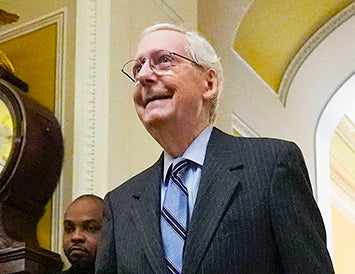‘One of the most consequential Americans in history:’ A look into McConnell’s legacy
Published 11:03 am Friday, March 1, 2024

- Senate Minority Leader Mitch McConnell of Ky., walks to the Senate to speak on the Senate floor, Wednesday, Feb. 28, 2024 at the Capitol in Washington. McConnell says he'll step down as Senate Republican leader in November. The 82-year-old Kentucky lawmaker is the longest-serving Senate leader in history. He's maintained his power in the face of dramatic changes in the Republican Party. He's set to make the announcement Wednesday McConnell on the Senate floor.(AP Photo/Mark Schiefelbein)
Senate Minority Leader Mitch McConnell announced Wednesday that he will step down from his leadership position in November.
But while McConnell may take a back seat in the Senate, his impact on Kentucky and the nation will remain front and center for generations.
McConnell was elected to Congress in 1984 by just over 5,000 votes. Since then, he’s won six more elections with much wider vote margins. Now, he’s the longest serving U.S. Senate leader in history.
On a national level, McConnell’s legacy might center around his impact on the conservative makeup of the federal judiciary, but his influence on Kentucky may be just as strong.
‘Always there:’ McConnell’s path to leadership
After attending law school at the University of Kentucky, Alabama-born McConnell quickly gained legislative experience as an assistant to Republican Sen. Marlow Cook and a deputy assistant attorney general under President Gerald Ford.
In 1978, he was elected as Jefferson County’s judge-executive, where he stayed until winning his first congressional bid in 1984 as President Ronald Reagan was re-elected.
“I think, in many ways, he is a link and a bridge to the Reagan Revolution and what was ushered in through Ronald Reagan and his presidency,” said Daniel Cameron, former Republican attorney general, governor candidate and McConnell staffer.
About a decade after entering Congress, McConnell was tapped to be the chairman of the National Republican Senatorial Committee, whose goal is to get more Republicans elected. In a way, McConnell never lost sight of that work. The Senate Leadership Fund, a political action committee associated with McConnell and led by his former chief of staff, has raised and spent just over $1 billion since 2015 to win races for Republicans, according to Federal Election Commission data.
Tres Watson, former spokesperson for the Republican Party of Kentucky, said McConnell is often involved in state races. He would ask for data and show a willingness to help, whether through additional fundraising or a well-placed call, Watson recalled.
McConnell is sometimes credited with convincing two Democratic Kentucky senators, Dan Seum and Bob Leeper, to switch parties in 1999, granting Republicans majority control of the state Senate for the first time in history in 2000.
“He was always there,” Watson said. “He had a strong interest in making sure that the state became a Republican state, and he was hands-on, actively involved in the process.”
From 2003 to 2007, McConnell cut his teeth as the Republican party whip. His caucus elected him as minority leader in 2007, and he became majority leader in 2015.
‘Refashioning of the federal judiciary’
In June 2022, the U.S. Supreme Court overturned Roe v. Wade, eliminating the constitutional right to abortion.
Without McConnell, that may not have happened. When Justice Antonin Scalia died in early 2016, he left the nation’s highest court in a 4-4 split between conservative and liberal justices.
McConnell blocked the vote on President Barack Obama’s nomination, Merrick Garland, citing proximity to the election.
“The American people should have a say in the court’s direction,” McConnell said. “It is a president’s constitutional right to nominate a Supreme Court justice, and it is the Senate’s constitutional right to act as a check on the president and withhold its consent.”
But when President Donald Trump won in 2016, conservative judge Neil Gorsuch was confirmed with McConnell’s support.
McConnell’s move “took a lot of courage and strength,” Cameron said.
One vote can be the difference in cases like Roe v. Wade, said longtime Kentucky journalist Al Cross. He noted that McConnell also confirmed a record number of federal appeals court judges.
“You can say without fear of contradiction that his lasting mark on the nation is the refashioning of the federal judiciary with conservative judges and the repeal of a constitutional right that existed for 49 years,” Cross said.
Last January, McConnell and President Joe Biden shared a stage in front of the Brent Spence Bridge to celebrate a historic $3.6 billion project to build a companion bridge.
Thanks to $1.6 billion in federal grants made possible by the 2021 Bipartisan Infrastructure Act, the project, decades in the making, won’t require tolls.
Gov. Andy Beshear called McConnell’s work on the infrastructure bill “an incredible legacy moment of breaking through partisanship.”
McConnell has made a concerted effort to deliver for Kentucky. He’s ensured that research programs at the University of Kentucky — the Markey Cancer Center — and the University of Louisville were developed, Watson said.
McConnell has used his membership on the Agriculture Committee to ensure Farm Bills focus on Kentucky issues, like the legalization of hemp so that Kentucky farmers hurt by the loss of tobacco subsidies could regroup.
He fought Obama era regulations, including one attempting to curb pollution from coal plants and mines.
In 2019, McConnell was able to secure $912 million in an omnibus spending bill for Kentucky, including tax breaks for Kentucky’s thoroughbred horse racing industry and spirits distillers.
After McConnell’s announcement last week, Kentucky political leaders cited his ability to allow Kentucky to punch above its weight.
Kentucky Senate President Robert Stivers gave McConnell credit for “putting Kentucky on a much better trajectory” with his state and federal contributions.
Cross said that Kentucky will continue to benefit from his influence for the next two years, even after stepping down.
“But after that, you have to wonder because, frankly, Rand Paul has not been somebody who seemed all that much interested in delivering for Kentucky,” Cross said. “ . … I like to say that Rand Paul is in the Senate to make a point, not to make a difference.”
Watson doesn’t know if anyone can replicate McConnell’s “innate ability to know how much leash to give these very varied personalities in his caucus.”
“It’s a real skill to be able to manage those personalities, those egos, those agendas in that way and know how to balance everything,” he said. “ … without somebody on top who can do that, it’s possible that this caucus fractures as badly as you’ve seen in the House.”
Robert Kahne, Kentucky Democratic Party State Central Executive Committee member and co-host of “My Old Kentucky Podcast,” has a different perspective.
While Kahne called McConnell “one of the most consequential Americans in history,” he doesn’t mean it positively.
McConnell was “craven and cynical enough” to deploy certain legislative rules to get his way, which inspired Democratic Senate Leader Harry Reid to do the same, Kahne said.
In 2013, in an effort to push through Obama judicial nominations, Reid changed the filibuster rules — which require 60 votes to end — so they would no longer apply to federal judgeships below the Supreme Court.
Later, when Republicans held a majority, McConnell extended the end of the filibuster to the Supreme Court.
He said that as “a very transactional, cynical politician,” McConnell has shifted the environment of the U.S. Senate from a place where people were expected to make compromises and work for something bigger than themselves and their party to a chamber of selfish, highly partisan individuals.
“I think that the country is really careening toward a lot of tragedies and I hope certainly that they don’t happen, but if they do, I think it’s really important that we remember that the groundwork was laid by Mitch McConnell,” Kahne said.
Cross agreed that the Senate has become more partisan thanks to McConnell and Reid’s liberal use of the filibuster to block significant bills.
The Trump of it all
One thing McConnell supporters and detractors agree on is that the Senator was critical in pushing Donald Trump’s agenda.
“While Mitch McConnell and Donald Trump aren’t necessarily on the best of terms over things like Jan. 6, without the cynicism that Mitch McConnell brought to politics and made the prevailing behavior of all politicians in Washington, you don’t get Donald Trump and you don’t get Jan. 6,” Kahne said.
During the Trump administration, McConnell spearheaded the passage of several high profile laws, including the Tax Cuts and Jobs Act of 2017.
He voted against impeaching Trump after the Jan. 6 attack on the Capitol.
“If you like Donald Trump, and you like the things he did when he was president, then you have to thank Mitch McConnell, because Mitch McConnell’s leadership in the Senate is what made all those things possible,” Watson said.
But make no mistake, Cross said, McConnell “despises” Trump. Before his announcement, Cross said McConnell was negotiating about a Trump endorsement, and he thinks that the timing could be related.
If a Senate leader is not willing to endorse their party’s nominee, they’re probably not in a good position to be the leader, Cross said.
“They’ve all got something they can agree on,” he said. “That is, we want to win this election and want to win Senate elections.”
Watson said it goes beyond Trump, to the general shifting of the Republican Party away from McConnell’s priorities, particularly on foreign policy issues.
Historically, McConnell has been able to pass aid packages to Ukraine. But recently, attempts to get aid to Israel and Ukraine have been more difficult, while Trump has expressed less willingness to fund wars in Ukraine and Israel.
Replacing McConnell
Many have wondered whether McConnell’s health issues will prevent him from serving his entire term.
Last year, McConnell suffered a concussion from a fall and experienced two high-profile “freeze-ups” while speaking. His team told the Associated Press that his announcement was unrelated to his health.
If McConnell does end his term in 2026, as planned, Watson said he expects “a fairly robust primary.”
Some potential contenders include Cameron and former U.S. Ambassador Kelly Craft, who both ran for governor last year, and U.S. Reps. Andy Barr and Thomas Massie.
State Rep. Steven Rudy, R-Paducah, is carrying a bill that would change the protocol for replacing a U.S. Senator if a vacancy does happen before their term ends. Right now, the governor would be able to appoint a replacement from a list provided by the outgoing senator’s party.
Rudy’s bill would require a special election instead. He said that it has nothing to do with McConnell.
McConnell is a leader who has always looked out for the long range interests of the country and Kentucky, Cameron said.
“Change isn’t made over the course of a day,” Cameron said. “It happens over a period of time, and his persistence and determination to see change that has improved our nation, certainly, I think he will be remembered for that.”





